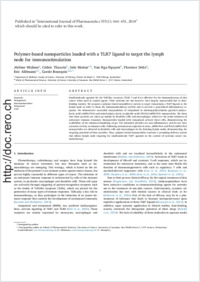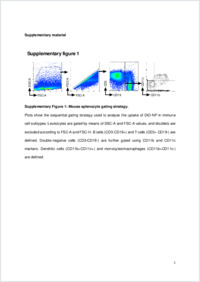Polymer-based nanoparticles loaded with a TLR7 ligand to target the lymph node for immunostimulation
- Widmer, Jérôme Department of Medicine, Faculty of Science, University of Fribourg, Switzerland
- Thauvin, Cédric School of Pharmaceutical Sciences, University of Geneva, Switzerland
- Mottas, Inès School of Pharmaceutical Sciences, University of Geneva, Switzerland
- Nguyen, Van Nga School of Pharmaceutical Sciences, University of Geneva, Switzerland
- Delie, Florence School of Pharmaceutical Sciences, University of Geneva, Switzerland
- Allémann, Eric School of Pharmaceutical Sciences, University of Geneva, Switzerland
- Bourquin, Carole Department of Medicine, Faculty of Science, University of Fribourg, Switzerland - School of Pharmaceutical Sciences, University of Geneva, Switzerland
-
15.01.2018
Published in:
- International Journal of Pharmaceutics. - 2018, vol. 535, no. 1, p. 444–451
English
Small-molecule agonists for the Toll-like receptors (TLR) 7 and 8 are effective for the immunotherapy of skin cancer when used as topical agents. Their systemic use has however been largely unsuccessful due to dose-limiting toxicity. We propose a polymer-based nanodelivery system to target resiquimod, a TLR7 ligand, to the lymph node in order to focus the immunostimulatory activity and to prevent a generalized inflammatory response. We demonstrate successful encapsulation of resiquimod in methoxypoly(ethylene glycol)-b-poly(DL-lactic acid) (mPEG-PLA) and mixed poly(DL- lactic-co-glycolic acid) (PLGA)/mPEG-PLA nanoparticles. We show that these particles are taken up mainly by dendritic cells and macrophages, which are the prime initiators of anticancer immune responses. Nanoparticles loaded with resiquimod activate these cells, demonstrating the availability of the immune-stimulating cargo. The unloaded particles are non-inflammatory and do not have cytotoxic activity on immune cells. Following subcutaneous injection in mice, mPEG-PLA and PLGA/mPEG-PLA nanoparticles are detected in dendritic cells and macrophages in the draining lymph nodes, demonstrating the targeting potential of these particles. Thus, polymer-based nanoparticles represent a promising delivery system that allows lymph node targeting for small-molecule TLR7 agonists in the context of systemic cancer immunotherapy.
- Faculty
- Faculté des sciences et de médecine
- Department
- Département de Médecine
- Language
-
- English
- Classification
- Biological sciences
- License
-
License undefined
- Identifiers
-
- RERO DOC 306863
- DOI 10.1016/j.ijpharm.2017.11.031
- Persistent URL
- https://folia.unifr.ch/unifr/documents/306530
Other files
Statistics
Document views: 85
File downloads:
- pdf: 156
- Supplementary material: 105

